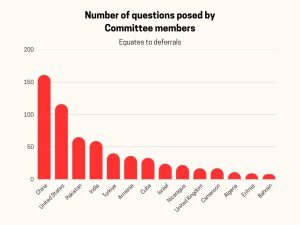© UN Web TV

NGO Committee concludes its 2025 regular session amid continued calls for reform
The ECOSOC Committee on NGOs concluded its 2025 regular session today reiterating the need for reform to improve its working methods to enable effective civil society engagement at the UN.
On 31 January, the Committee concluded its regular session of 2025, reviewing 536 NGO applications for consultative status. Of these, 213 were new and 323 had been deferred from previous years. A total of 148 NGOs were recommended for accreditation, including 119 new and 29 deferred, bringing the approval rate for deferred applications to only 8.9%, compared to 55.8% for new applications. Overall, 27.6% of the applications were approved, marking a modest increase of 6% from last year’s resumed session (21.6%).
While echoing the importance of NGOs’ participation in the work of the UN, China and the United States together accounted for nearly 45% of all the questions posed in total during the session, leading to deferrals in the request for UN accreditation.

© ISHR. All figures are based on ISHR’s in person monitoring of sessions.
Led by the newly elected Vice Chair from the United Kingdom, and following a decision adopted last year to improve the working methods of the Committee, this session concluded in 13 meetings instead of the planned 16. Consequently, two Q&A sessions between NGO representatives and the Committee, which are an opportunity for NGOs to respond to questions from Committee members in real time were cancelled.
As some members of the Committee expressed concerns regarding the precedent set by rescheduling the Q&A to a different time in light of the changed schedule, the Committee decided to cancel two Q&A sessions altogether. During this session, two applicant NGOs were recommended for accreditation after addressing the Committee’s questions during the Q&A sessions that did take place. ‘While it is crucial that limited resources be used efficiently, it is equally important to ensure that any efficiency measures do not diminish the already limited space for civil society engagement at the UN,’ said ISHR’s Maithili Pai.
Although granted two new positions, the NGO Branch stressed that the increase in resources remained insufficient to meet its needs and fully fulfill its mandate. In 2024 alone, it received an unprecedented 845 applications for consultative status. Recognising that the innovative ideas and technical expertise provided by NGO observers are essential to accountability and creative problem-solving in multilateral bodies, the NGO Branch expressed regret over the ongoing use of deferrals for reasons other than those outlined in the terms of reference of ECOSOC resolution 1996/31.
The United Kingdom reminded that it has worked alongside Costa Rica to reform the Committee’s working methods, acknowledging others’ engagement in this effort. The European Union welcomed the 2024 decision of Costa Rica and the United Kingdom and supported its calls for annual consultations with NGOs to be conducted as per ECOSOC resolution 1996/31 including in 2025.
The EU also called for overdue reforms to improve the Committee’s working methods ‘to ensure a more inclusive, effective, fair, and transparent functioning of the Committee,’ including addressing unjustified deferrals of NGOs seeking accreditation, consulting civil society and Member States to identify recommendations for meaningful reform of the NGO committee and instituting hybrid Q&A sessions for applicant NGOs globally to engage remotely.
